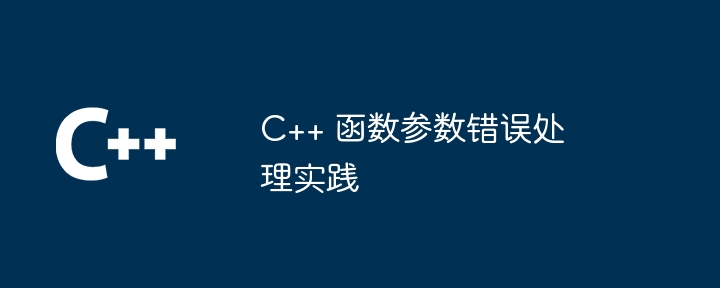
C Function parameter error handling can use the following techniques in practice: Exceptions: Use try-catch blocks to catch exceptions and provide error information. Assertions: Use assertions to check parameter validity and terminate the program on failure and print an error message. Error code: The function returns an error code to indicate an error condition.

C Function parameter error handling practice
In software development, function parameter error handling is crucial, it can prevent Invalid or inconsistent input can cause a program to crash or behave unexpectedly. C provides a variety of techniques for efficiently handling function parameter errors.
1. Using Exceptions
C provides the exception class to handle error situations. We can use the try-catch block to catch exceptions in the function:
void function(int n) {
try {
if (n < 0) throw std::invalid_argument("n must be non-negative.");
// 函数逻辑...
} catch (const std::invalid_argument& e) {
std::cerr << "Error: " << e.what() << std::endl;
}
}2. Use assertions
Assertions can check the validity of function parameters . If the assertion fails, it will terminate the program and print an error message.
void function(int n) {
assert(n >= 0);
// 函数逻辑...
}3. Return error code
The function can return an error code to indicate an error situation. For example:
int divide(int a, int b) {
if (b == 0) return -1; // 错误码:除数为零
return a / b;
}Practical case
The following is an example of using exceptions to verify function parameters:
// 计算圆的面积
double area_circle(double radius) {
if (radius < 0) throw std::invalid_argument("Radius must be non-negative.");
return M_PI * radius * radius;
}
int main() {
try {
double result = area_circle(-2.5); // 触发异常
} catch (const std::invalid_argument& e) {
std::cerr << "Error: " << e.what() << std::endl;
}
return 0;
}Output:
Error: Radius must be non-negative.
The above is the detailed content of C++ function parameter error handling practice. For more information, please follow other related articles on the PHP Chinese website!
 What are the differences between c++ and c language
What are the differences between c++ and c language
 Recommended learning order for c++ and python
Recommended learning order for c++ and python
 Cost-effectiveness analysis of learning python and c++
Cost-effectiveness analysis of learning python and c++
 Is c language the same as c++?
Is c language the same as c++?
 Which is better to learn first, c language or c++?
Which is better to learn first, c language or c++?
 The difference and connection between c language and c++
The difference and connection between c language and c++
 C++ software Chinese change tutorial
C++ software Chinese change tutorial
 Cost-effectiveness analysis of learning python, java and c++
Cost-effectiveness analysis of learning python, java and c++




